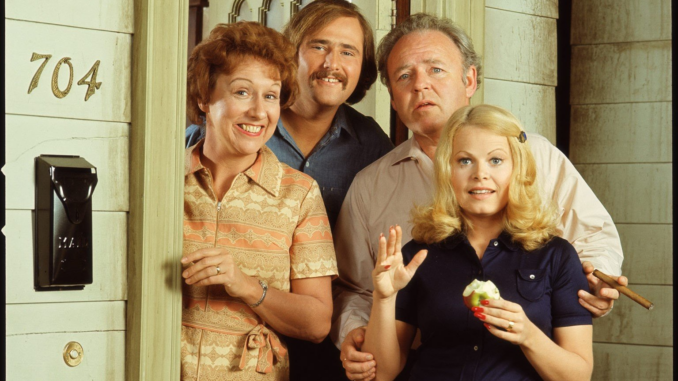
Introduction: A Show That Dared to Tackle America’s Toughest Issues
In 1971, when All in the Family debuted, it didn’t just break with television tradition—it rewrote the rulebook entirely. At a time when TV comedies were mostly about lighthearted humor and family-friendly plots, All in the Family threw a bold, irreverent spotlight on some of America’s most sensitive and divisive issues: race, politics, class, and the changing roles of men and women. The show became a cultural sensation, drawing both praise and controversy for its no-holds-barred approach to humor and its unapologetic exploration of societal flaws.
Breaking the Political Molds: Comedy with a Message
All in the Family was the first TV sitcom to truly dive into political commentary. At the heart of the show was Archie Bunker, a conservative, blue-collar man whose opinions on everything from race to gender were outdated and often offensive. Archie’s views reflected those of many working-class Americans at the time—frustrated by the changes in society, clinging to old values, and often resisting the civil rights and feminist movements. The beauty of the show was not just in mocking Archie’s beliefs, but in exploring them. It showed viewers that, while Archie’s bigotry was problematic, it was also a reflection of a larger social issue that needed to be addressed.
Race and Class: A Mirror to Society’s Divisions
One of the most groundbreaking aspects of All in the Family was its treatment of race. At a time when television largely ignored issues of race, All in the Family confronted them head-on. Archie’s casual racism and his derogatory language toward minorities became the show’s focal point for addressing America’s racial divides. But the show didn’t just vilify Archie—it used him as a vehicle to spark important discussions about race relations, particularly between the older, conservative generation and the younger, more liberal ones.
The show also didn’t shy away from exploring class struggles. Archie was a working-class man struggling to make ends meet, while his son-in-law Mike was a college-educated, politically active young man. This contrast reflected the growing economic divide in America and provided a platform for discussing issues like income inequality, labor rights, and the struggles of the working class.
The Show’s Lasting Legacy in Today’s TV Landscape
All in the Family may have been ahead of its time, but its influence can still be seen in today’s television landscape. Shows like The Simpsons, Family Guy, and even The Office owe a great deal to the groundbreaking approach to social commentary that All in the Family pioneered. Even as comedy has evolved, All in the Family remains a shining example of how television can use humor to tackle important, often uncomfortable, topics.
Conclusion: More Than Just a Sitcom
All in the Family was more than just a TV show—it was a cultural revolution. It opened up a space for conversations about race, class, politics, and gender that had previously been left out of the mainstream. By using comedy to address serious societal issues, the show not only entertained but educated. It challenged viewers to look at themselves and the world around them in new ways, and its legacy continues to influence television today.
